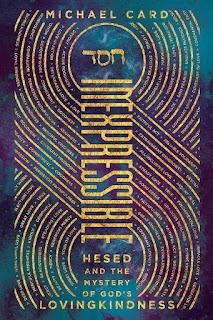I was thinking this morning of Psalm 136 and the reminder to
“Give thanks to the Lord, for He is good, for His steadfast love endures
forever” (v. 1). When you read through the whole psalm, it is tempting to skim
over the repeated refrain “for His steadfast love endures forever” as the
author recounts the exodus from Egypt. But that refrain may actually be the
part we need to remember most. God’s steadfast love really does endure forever.
On this particular day we remember the events of 9/11, and
we also are saddened by the news of the assassination of Charlie Kirk. We live
in a sinful and broken world, and yet God’s steadfast love endures forever.
A child wanders off and dies. God’s
steadfast love endures forever.
Another family adopts a child. God’s
steadfast love endures forever.
One person lives decades with
chronic illness. God’s steadfast love endures forever.
Another person dies at a young age.
God’s steadfast love endures forever.
Some nations are perpetual
battlegrounds. God’s steadfast love endures forever.
Some nations enjoy centuries of
peace. God’s steadfast love endures forever.
When we are on the mountaintop, God’s
steadfast love endures forever.
When we are in the deepest valleys,
God’s steadfast love endures forever.
Michael Card wrote about Romans 5, “If we dared to be honest
with Paul or ourselves or God, we might mutter that we were hoping for a little
more than just hope as we huddle in our worn-out, earthly, cancer-ridden, death
impregnated tents. But as he so often does, Paul anticipates our response. “Hope
does not disappoint us,” he counters, because God has poured something into
these hearts that beat so feebly behind the worn-out flaps of our earthly tent.
He has poured His love into them through His Holy Spirit (Romans 5:5)” (The
Hidden Face of God, ch. 26).
No matter what happens in our lives or in the world around
us, God’s love never changes. That is what we hold onto and gives us comfort
and hope when things go wrong. “Those who trust in the Lord are like Mount Zion,
which cannot be moved, but abides forever” (Ps. 125:1). God’s love helps us to
endure the hard times and to keep faith when we don’t understand. Let us cling
to Him as firmly as He holds onto us.
“Now may our Lord Jesus Christ himself, and God our
Father, who loved us and gave us eternal comfort and good hope through grace,
comfort your hearts and establish them in every good work and word” (2 Thess.
2:16-17).
“Oh give thanks to the Lord, for He is good; for His
steadfast love endures forever!” (Ps. 118:1).
© 2025 Text and image Dawn Rutan. Unless otherwise indicated, all Scripture are ESV. The opinions stated do not necessarily reflect the views of my church or employer.



















